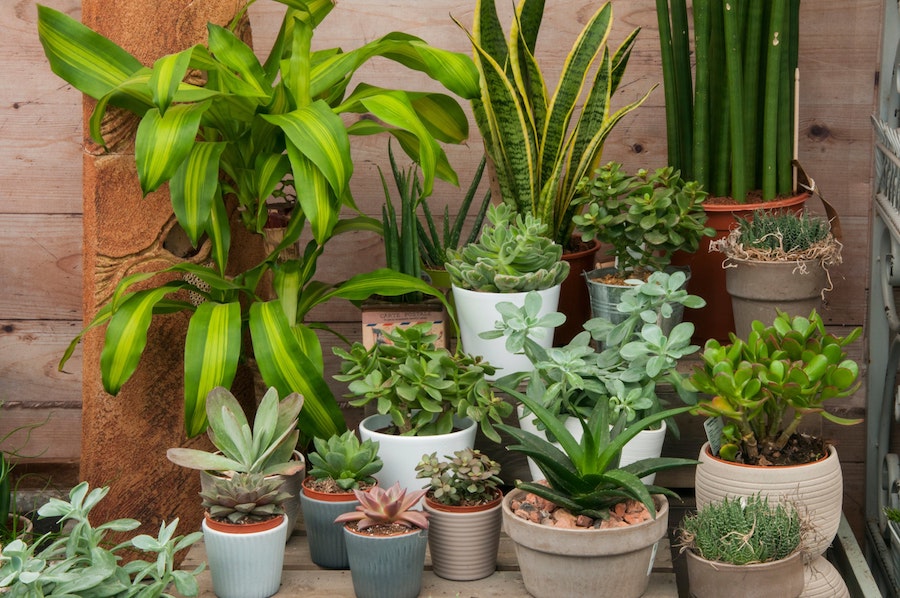5 ways houseplants can boost your wellbeing
As the urban footprint becomes larger, more people are destined to be living in properties without a garden – yet houseplants can help bring the outside in.
From giant rubber plants and ferns as feature pieces to a spider plant trailing from a shelf, they can completely change the look of any room. But beyond the aesthetics, there’s evidence to suggest houseplants are also good for your health and wellbeing.
Dr Tijana Blanusa, principal horticultural scientist at the Royal Horticultural Society, offers five suggestions as to how houseplants can benefit your body and mind:
1. They can reduce ‘sick building syndrome’

Plants can alleviate tired and itchy eyes
Houseplants can help reduce the impact of ‘sick building syndrome’ which includes dry skin, itchy eyes, respiratory irritations and headaches.
They help moisturise the skin and alleviate dry eyes by increasing relative humidity inside the home or office. This happens via plants increasing air humidity levels through evapo-transpiration – the movement of water from leaves and soil into the atmosphere.

Peace lilies can increase air humidity
Varieties such as peace lilies and ivy with higher transpiration rates appear to be better than most other houseplants.
2. Some plants trap chemical gases

Houseplants can absorb nasty kitchen smells
Cooking can make the kitchen smell wonderful, as garlic, wine and spices fill the air. But the aftermath of a good fry up or casserole is also a range of potentially harmful gaseous and volatile chemical compounds (VOCs). However, plants can capture these in three ways: via small pores in their leaves called the stomata, by diffusion through plant cuticle on the leaf surface and via the activity of soil micro-organisms.
Varieties of dracaena (a small shrub), ficus (figs), nephrolepis (ferns) and syngonium (vines) have the potential to remove the largest quantities of these compounds.
3. They do the dusting for you (well, almost)

Ornamental figs help to reduce dust particles getting up your nose
Likewise, houseplants are great at capturing little airborne particles that would otherwise be breathed in. This is simply by providing additional surface area on which particles can be captured.
Plants with large canopies like Ficus Arabica with large individual leaves or Ficus Benjamina with huge numbers of smaller leaves provide a good surface.
4. Plants can help increase productivity

Office plants create positive responses
Houseplants can also help improve productivity in offices and workspaces, along with occupants’ perceived wellbeing; the exact mechanisms are not known but can be partially explained through the so called ‘attention restoration theory’.
There is a suggestion that a variation in plant shape, size and colour within planting schemes elicits positive responses. Therefore a mix of plant species in a room, some flowering and some leafy, is likely to have a positive effect.
5. They boost your mental health

Group plants together for a positive outlook
We all know the joy a garden can bring, and filling the home with plants is similar – greenery is pretty, and tending for houseplants can give you a great sense of purpose and reward, too.
Try pretty succulents or orchids to bring some flower power to your collection. Alternatively go for some large ferns for drama and impact. Additionally, groupings of plants often grow better as humidity tends to naturally increase around them, reducing stress on the plants as well as you.
For more advice on getting the most from your houseplants visit the RHS Urban Garden Show on Oct 27 and 28, where expert growers will be exhibiting and selling the very best tropical houseplants, seasonal blooms and spring flowering bulbs.
The Press Association
Latest posts by The Press Association (see all)
- 8 things your feet can tell you about your health - January 8, 2025
- 9 ways to look after your emotional health better in 2025 - January 7, 2025
- EastEnders fans to vote on storyline for the first time in 40th anniversary week - January 7, 2025
- Aldi beats rival Lidl as cheapest supermarket of 2024 - January 6, 2025
- All the benefits of lifting weights beyond bigger muscles - January 6, 2025





















